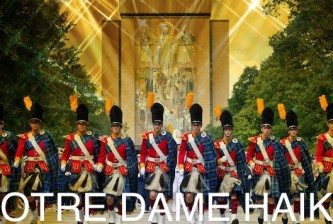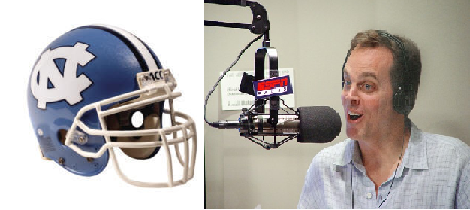So while the NCAA is continuing to deal with the nightmare that is Penn State, it now finds itself facing what just might be the largest scheme of academic fraud in history at the University of North Carolina. The scale of the alleged fraud is simply mind-boggling. Two department chairs and other assorted academic advisors purportedly placed dozens of athletes in bogus classes with no work. All you had to do is just register and you got an A and some credit. Wow. If anything is worthy of “death-penalty” type sanctions this would be it. It goes to the heart of preserving academic integrity while meeting the textbook definition of “lack of institutional control.”
Now, I don’t normally write about other programs’ woes, because schadenfreude is not a feeling one should enjoy. But the level of cynicism this story has received from certain parts of major sports media is truly offensive. On that score, ladies and gentlemen, I give you noted Notre Dame hater, Colin Cowherd, on the steaming mess coming out of Chapel Hill (sharing has been disabled on the four-letter site so you can watch at this link).
If you don’t care to listen to Cowherd– which is understandable– I have a rough transcript with some commentary as to why Cowherd’s take particularly rankled. So read more after the jump!
First, some background. Back in the day I was a grad student at Notre Dame, in the late 1990s during the Davie era. One semester I took a job as a tutor through Notre Dame’s Office for Academic Services for Student Athletes. Money was tight back then and if I remember they paid about $12 per hour to the tutors (maybe $10) so I was absolutely thrilled with that amount. I was assigned to a couple of students who happened to be football players. When I would meet these young men it was usually in the building immediately behind the main building (but as I understand has since moved into the fabulous Coleman-Morse center). Between the hours of 10:00PM to midnight that place was buzzing. My students were both soft-spoken and humble and genuinely interested in succeeding in their course work. I worked with one of them on business statistics and another on research methods for one of the social sciences. I tried my best to make the material relevant and comprehensible for them. It was extremely gratifying work.
A couple of weeks into the semester the assistant dean in charge of the tutoring program asked me to take on another job. Would I be interested in making sure that some “at risk” athletes were attending their classes? “Spying on kids?” I thought to myself. Not sure if that was any of my business. Besides, wasn’t this just a cynical ploy to keep these kids eligible? This dean, who was all business, assured me it was not. What’s the first rule for making it through college? Going. To. Class. Yes the University had an interest in keeping these players eligible, but they had (and still have) no truck with suspending students who couldn’t make the grade. I came away with the distinct impression this was done entirely with the best interests of the student in mind. So I signed on for that semester and was given a media guide (so I’d know what the players looked like) and a list of maybe a half-dozen students with their class schedules. I was supposed to monitor them and report back to my boss.
My schedule was pretty flexible and because I looked five years younger than my age I just blended in with the crowds bustling too and fro to get to class. I’d wear my ND baseball cap pulled down, hang out by the water fountain and check off if I saw player X go to class. Most of them were diligent. Some who missed I reported on and they were later given “reminders” about how important it was to be in class (not by me, of course, but folks higher up) and they showed back up. Nowhere did I observe a blatant disregard for attending class or a sense of entitlement from the athletes. To this day I’m still not sure how I feel about that job but if it contributed in some small way to making sure some kids graduated instead of falling through the cracks, then it was worth it.
Which brings us back to Mr. Cowherd. The other day he brings up the UNC scandal only to pooh-pooh the seriousness of it.
“And I’m not gonna pick on North Carolina because I think if you look at every major college power in football… Ohio State, Florida State, LSU, ‘Bama, it doesn’t matter, it’s all academic fraud. To a large degree what is happening in college football and college basketball is academic fraud. People are allowed to go to schools with SAT scores 200-300 points lower, who we all know are allowed to take easy breezy classes… in college basketball it’s sad… at least in college football you have to be there for years but all you have to do is pass them as long as you don’t fail the class and they are giving you the easiest classes.”
No Mr. Cowherd, it isn’t every major power in football. There are still places where academic fraud as you define it isn’t integrated into the University. I can testify first hand to that it doesn’t happen at Notre Dame. Yes, the admissions criteria for athletes are lower than for non-athletes. They are given an athletic scholarship to represent the students of the University on the field of play. But at ND they are simply not allowed to take “easy breezy classes.” There are no “easy breezy classes” at ND. Every student must take calculus. Every student must take theology. Every student must take a college level writing class. So while yes, in a sense, “all you have to do is pass” they are not given “the easiest classes.” Colin continues:
“… And realistically given the amount of time that they have to devote to their sport they would have to be academically superior to the average student to do well in their classes and they are often academically inferior.”
This is the first nugget of sense that you can find. Yes, it is true, given the time that student athletes are required to devote to their sport it does make course work that much more challenging. Notre Dame recognizes this by providing academic resources to help these young people that are second to none. The proof is in ND's graduation rate for anyone who cares to look. Why does ND do this? Because the University realizes what it is asking from these kids is extremely demanding: excellence on the field without compromising academics in the classroom. It is a simple matter of fairness to provide them with every tool they might need to succeed in the classroom.
Now after that one insightful remark, Colin goes into full-blown apologist mode:
"So I never beat up on these major colleges when it comes to this stuff because it all comes down to the word “fraud.” What is academic fraud? I think college football and basketball right now— I think there is a certain level of fraud to the entire system. People that couldn’t normally qualify because they are allowed in… when they couldn’t otherwise they are given classes just trying to stay eligible. I’ve been covering sports for years and there is absolutely no question some of these kids are not college athletes.”
So you never beat up on a “major college” because… why again? Because everyone does it? Are you serious? Please don’t make me resort to if North-Carolina-jumped-off-a-bridge-would-you-do-it, Colin? I get, Mr. Cowherd, that you have a too-cool-for-school attitude toward most things, but where would you draw the line? Should we abolish student athletics all together? Or should we aspire to something more?
The final bit of cynicism come here:
“And you know it would be ideal if everyone did it like Stanford or Vanderbilt, but it doesn’t work that way. So that is the system and I’m not gonna be the moralist, I’m not gonna be the preacher, I’m not gonna lecture universities like North Carolina because I think that everyone plays that game. There are very few exceptions.”
Notice which notable program is left out as doing it the right way? Of course you did. I’m not blaming Colin Cowherd for the ethical cesspool that is major college athletics, but his attitude doesn’t help matters. He has a major platform for discussing these issues and claims not to be a moralist or a preacher. Nice. You don’t have to be either one, you just have to be a decent person to recognize that a University is meant to aspire to more. There will be no reform of major college athletics as long as extreme cynics of Cowherd’s variety are in charge of our national sports discourse.























